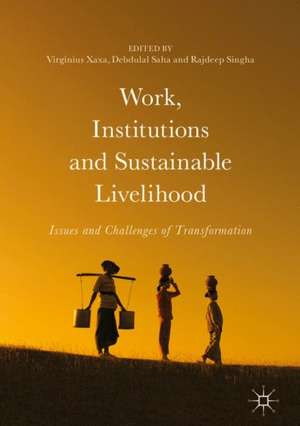Work, Institutions and Sustainable Livelihood: Issues and Challenges of Transformation
Editat de Virginius Xaxa, Debdulal Saha, Rajdeep Singhaen Limba Engleză Hardback – 6 noi 2017
Based on both theoretical and empirical studies from Asia and Africa, the book establishes the relationship between three broad concepts – work, institutions and sustainable development. The content has been divided into three broad sections: Rural Economy and Its Transformations; Urbanisation and Sustainable Livelihood; and Innovations and Instruments of Transformation. This book is a valuable resource for scholars of development studies, rural and urban studies, labour studies besides economics, sociology, political science and policymaking.
| Toate formatele și edițiile | Preț | Express |
|---|---|---|
| Paperback (1) | 640.88 lei 6-8 săpt. | |
| Springer Nature Singapore – 12 dec 2018 | 640.88 lei 6-8 săpt. | |
| Hardback (1) | 646.30 lei 6-8 săpt. | |
| Springer Nature Singapore – 6 noi 2017 | 646.30 lei 6-8 săpt. |
Preț: 646.30 lei
Preț vechi: 760.35 lei
-15% Nou
Puncte Express: 969
Preț estimativ în valută:
123.67€ • 129.45$ • 102.93£
123.67€ • 129.45$ • 102.93£
Carte tipărită la comandă
Livrare economică 31 martie-14 aprilie
Preluare comenzi: 021 569.72.76
Specificații
ISBN-13: 9789811057557
ISBN-10: 9811057559
Pagini: 333
Ilustrații: XXVI, 333 p. 25 illus.
Dimensiuni: 148 x 210 mm
Greutate: 0.58 kg
Ediția:1st ed. 2017
Editura: Springer Nature Singapore
Colecția Palgrave Macmillan
Locul publicării:Singapore, Singapore
ISBN-10: 9811057559
Pagini: 333
Ilustrații: XXVI, 333 p. 25 illus.
Dimensiuni: 148 x 210 mm
Greutate: 0.58 kg
Ediția:1st ed. 2017
Editura: Springer Nature Singapore
Colecția Palgrave Macmillan
Locul publicării:Singapore, Singapore
Cuprins
Introduction.- Part I Rural Economy and its Transformation.- Chapter 1 Rural Transformation and Indigenous Peoples in India.- Chapter 2 Ghana’s Gold Boom and Multinational Corporations: Resource Nationalism or Countervailing Force?.- Chapter 3 Augmenting Small Farmers’ Income through Rural Non-farm Sector in India: Role of Information and Institutions.- Chapter 4 Social Welfare, Unemployment and Public Works in Rural Southern Mozambique.- Chapter 5 Understanding social reality(ies) of rural livelihoods: Insights from a comprehensive study in two villages in Mozambique.- Part II Urbanization and Sustainable Livelihood.- Chapter 6 A New Approach to Rural Labour Mobility in the Labour Surplus Economy: A Tripartite Labour Supply Model.- Chapter 7 Urbanization, Land Alienation and Proletarianization: a Study of Rajbansis in North Bengal.- Chapter 8 Street Food, Food Safety and Sustainability in Emerging Mega City: Insights from an Empirical Study in Hyderabad, India.- Part III Innovations and Instruments in Transformation.- Chapter 9 The Promises of New Instruments for the Promotion of Decent Work.- Chapter 10 Microcredits, Returns and Gender: of Reliable Poor Women and Financial Inclusion in South Asia.- Chapter 11 Organizing the Informal Economy in Senegal.
Notă biografică
Virginius Xaxa is Professor of Eminence at Tezpur University and former Deputy Director of Tata Institute of Social Sciences, Guwahati Campus, Assam, India. He is the author of Economic Dualism and Structure of Class (1997) and State, Society and Tribes (2008), co-author of Plantation Labour in India (1996) and co-editor of Social Exclusion and Adverse Inclusion: Adivasis in India (2012).
Debdulal Saha is an assistant professor at Tata Institute of Social Sciences, Guwahati Campus, Assam, India. He is the author of Informal Markets, Livelihood and Politics: Street Vendors in Urban India (2017), co-author of Financial Inclusion of the Marginalised (2013) and co-editor of Food Crisis and its Implication on Labour (2013).
Rajdeep Singha is an assistant professor and chairperson of the Centre for Labour Studies and Social Protection at Tata Institute of Social Sciences, Guwahati Campus,Assam, India. Prior to joining TISS, he taught at the Department of Economics at St. Joseph's College (Autonomous), Bengaluru, and was a research associate at the Indian Institute of Management Bangalore, Bengaluru, Karnataka, India.
Debdulal Saha is an assistant professor at Tata Institute of Social Sciences, Guwahati Campus, Assam, India. He is the author of Informal Markets, Livelihood and Politics: Street Vendors in Urban India (2017), co-author of Financial Inclusion of the Marginalised (2013) and co-editor of Food Crisis and its Implication on Labour (2013).
Rajdeep Singha is an assistant professor and chairperson of the Centre for Labour Studies and Social Protection at Tata Institute of Social Sciences, Guwahati Campus,Assam, India. Prior to joining TISS, he taught at the Department of Economics at St. Joseph's College (Autonomous), Bengaluru, and was a research associate at the Indian Institute of Management Bangalore, Bengaluru, Karnataka, India.
Textul de pe ultima copertă
The book explores the debates surrounding sustainable livelihood in the neoliberal era effected through transformation of the nature of work and the role of institutions, particularly in the Global South. By creating gainful work and employment opportunities through formal and informal institutions using progressive instruments and innovations within rural and urban economies, livelihood becomes ‘sustainable’, thereby reducing inequality and increasing resilience among households.Based on both theoretical and empirical studies from Asia and Africa, the book establishes the relationship between three broad concepts – work, institutions and sustainable development. The content has been divided into three broad sections: Rural Economy and Its Transformations; Urbanisation and Sustainable Livelihood; and Innovations and Instruments of Transformation. This book is a valuable resource for scholars of development studies, rural and urban studies, labour studies besides economics, sociology, political science and policymaking.
Caracteristici
Presents recent work on the rural-urban transformation Explores the role of institutions in promoting work and sustainable development Adopts an interdisciplinary approach combining economics, sociology and political science
